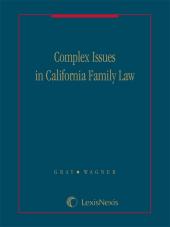Complex Issues in California Family Law - Volume F
Select a format
 International Order Inquiry
International Order Inquiry
Select subscription type
Terms & conditions
Subscribers receive the product(s) listed on the Order Form and any Updates made available during the annual subscription period. Shipping and handling fees are not included in the annual price.
Subscribers are advised of the number of Updates that were made to the particular publication the prior year. The number of Updates may vary due to developments in the law and other publishing issues, but subscribers may use this as a rough estimate of future shipments. Subscribers may call Customer Support at 800-833-9844 for additional information.
Subscribers may cancel this subscription by: calling Customer Support at 800-833-9844; emailing customer.support@lexisnexis.com; or returning the invoice marked "CANCEL".
If subscribers cancel within 30 days after the product is ordered or received and return the product at their expense, then they will receive a full credit of the price for the annual subscription.
If subscribers cancel between 31 and 60 days after the invoice date and return the product at their expense, then they will receive a 5/6th credit of the price for the annual subscription. No credit will be given for cancellations more than 60 days after the invoice date. To receive any credit, subscriber must return all product(s) shipped during the year at their expense within the applicable cancellation period listed above.
The total price includes the product(s) listed in the Order Form and any Updates for a limited period (minimum period of 30 days) after the order is placed ("Order Window"). Shipping and handling fees are not included in the grand total price.
All shipments may be returned, at subscribers' expense, for full credit of the Price within 30 days of receipt.
Shipments may not be returned, and no credits will be issued, more than 30 days after receipt.
After the Order Window, subscribers will receive notice of Updates along with the then-current grand total price and order process as Updates become available. Subscribers will only be shipped those Updates they specifically request.
Product description
The authors analyze the inherent right of reimbursement to the marital community when the efforts of one spouse have benefited only that spouse's separate property. The rules are nearly entirely judge-made; for this reason, equitable apportionment has more conflicting approaches than nearly any other fundamental family law area:
• Constructive fraud
• Lender intent doctrine
• Fiduciary duties
• Equitable offset
• Consent—which may eliminate the right to reimbursement
all of which affect the Pereira-Van Camp approaches used to calculate the apportionment once the underlying basis is proven.
eBooks, CDs, downloadable content, and software purchases are noncancelable, nonrefundable and nonreturnable. Click here for more information about LexisNexis eBooks. The eBook versions of this title may feature links to Lexis+® for further legal research options. A valid subscription to Lexis+® is required to access this content.
Table of contents
F1 Point of View
F2 Concept Underlying Equitable Apportionment: Constructive Fraud
F3 Consent—Defense to Equitable Apportionment or Reimbursement?
F4 Apportionment, Reimbursement and Other Equitable Remedies of Restitution
F5 Apportionment Based on Contributions of Community Efforts to Separate Property: Pereira, Van Camp and Progeny
F6 Equitable Apportionment Tracing
F7 Determining Reasonable Compensation
F8 Additional Pereira and Van Camp Apportionment Issues
F9 "Reverse Apportionment'' of Community Assets Based on Post-separation Efforts
F10 Where Do We Go from Here?
Appendix FI Capital-Labor Apportionment Method (“CLAM”)
Appendix FII Pereira and Van Camp Applications Chart
 Lexis Nexis
Lexis Nexis 
